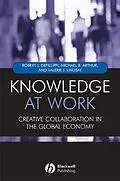This book's unique perspective stems from its "knowledge
diamond" framework to examine how individuals, communities,
organizations and host industries reciprocally influence each other
in the course of knowledge work.
* * This highly topical book focuses on work-based projects as a
focus for organizational learning.
* Establishes the link between individual, community,
organization and industry learning.
* Suggests that organizations need to recognise and understand
this link if they are to capitalize on project-based
learning.
* Incorporates material on project-based learning in virtual
communities.
* Refers to different examples, such as the film industry, the
software industry and the boat building industry.
* Includes end-of-chapter questions provoking reflection and
discussion.
Autorentext
Robert DeFillippi is Professor of Management and Director of
the Center for Innovation and Change Leadership at Suffolk
University, Boston.
Michael B. Arthur is Professor of Management at Suffolk
University, Boston.
Valerie J. Lindsay is Associate Professor in
International Business at Victoria University, Wellington, New
Zealand.
Zusammenfassung
This book's unique perspective stems from its knowledge diamond framework to examine how individuals, communities, organizations and host industries reciprocally influence each other in the course of knowledge work.
- This highly topical book focuses on work-based projects as a focus for organizational learning.
- Establishes the link between individual, community, organization and industry learning.
- Suggests that organizations need to recognise and understand this link if they are to capitalize on project-based learning.
- Incorporates material on project-based learning in virtual communities.
- Refers to different examples, such as the film industry, the software industry and the boat building industry.
- Includes end-of-chapter questions provoking reflection and discussion.
Inhalt
Preface.
1. Knowledge Workers and Knowledge Work.
Knowledge Work in the Global Economy.
What Do Knowledge Workers Do?.
Explicit and Tacit Knowledge.
Who Owns the Knowledge?.
Knowing and Learning.
The Interplay of Knowing and Learning.
Knowledge Work as Practice.
Communication between Practices.
Tools for Knowledge Work.
Clossed versus Open Perspectives.
Participants in Knowledge Work.
The Individual.
The Community.
The Organization.
The Industry.
The Knowledge Diamond.
The Chapters to Follow.
Questions for Reflection.
2. Individual Knowledge at Work.
Three Ways of Knowing.
Knowing-why.
Knowing-how.
Knowing-whom.
Interdependence among the Ways of Knowing.
The Individual and the Knowledge Diamond.
One Individual and Another.
The Individual and the Community.
The Individual and the Organization.
The Individual and the Industry.
Keeping the Individual in View.
Other Ways of Knowing?.
Free Agency and Trust.
Networks and Social Capital.
Tools for Individuals.
Summary.
Questions for Reflection.
3. Community Knowledge at Work.
Three Dimensions of Community Activity.
Joint Enterprise.
Shared Repertoire.
Mutual Engagement.
Interdependence among the Dimensions.
The Community and the Knowledge Diamond.
One Community and Another.
The Community and the Organization.
The Community and the Industry.
The Community and the Individual.
Keeping the Community in View.
Other Meanings of Community.
Organizational Communities.
Occupational Communities.
Community Social Capital.
The Returns on Community Social Capital.
Community and Inter-Community Knowledge Work.
Tools for Communities.
Summary.
Questions for Reflection.
4. Organizational Knowledge at Work.
The Organization's Core Competencies.
Organizational Culture.
Organizational Capabilities.
Organizational Connections.
Interdependencies Among the Core Competencies.
The Organization and the Knowledge Diamond.
One Organization and Another.
The Organization and the Individual.
The Organization and the Community.
The Organization and the Industry.
Keeping the Organization in View.
Knowledge Transfer in Strategic Alliances.
Exploitation versus Exploration.
Codification versus Personalization.
Closed versus Open Innovation.
Tools for Organizations.
Summary.
Questions for Reflection.
5. Industry Knowledge at Work.
Three Attributes of Industry Activity.
Industry Milieu.
Industry Recipes.
Industry System.
Interdependence among Industry Attributes.
The Industry and the Knowledge Diamond.
One Industry and another.
The Industry and the individual.
The Industry and the community.
The Industry and the organization.
Keeping the Industry in View.
Industry Regions and Regional Advantage.
Regional Closure and Brokerage.
Knowledge Transfer between Industries.
Business Ecosystems.
Tools for Industries.
Summary.
Questions for Reflection.
6. Projects and Knowledge Work.
The Evolution of Project-Based Knowledge.
Variation: The Beginnings of Exploration.
Selection: Between Exploration and Exploitation.
Retention: ...
